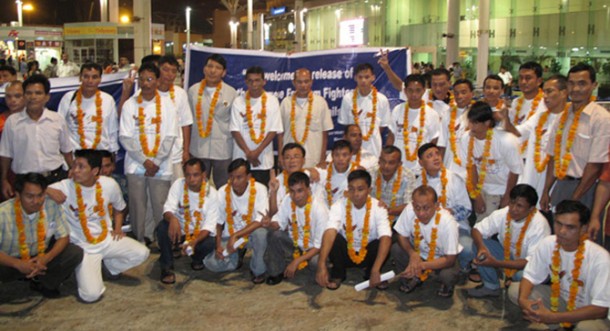Thirty-one Arakan and Karen guerrillas who spent 13 years in an Indian prison are on their way to the Netherlands on a resettlement program organized by the United Nations High Commissioner for Refugees (UNHCR).
Two others, an ethnic Karen and a Rakhine, will remain in India as their case for resettlement is still under consideration. One other freed convict, a Rakhine named Min Thar Tun, died from a heart attack a few months ago.
The 31 convicted freedom fighters are scheduled to leave New Delhi on Monday night and will arrive in Amsterdam the following day.
“Since we can’t go back to our country, we hope we will find better lives in the Netherlands,” said Pho Cho. “However, we are eager to go back to our own country—for better or worse. There is no other place like your home country.
“We [the convicted guerrillas] have spent over 10 years of bitter-sweetness together like a big family,” he said. “We are sad that two of our comrades must remain in Delhi. We hope that they can join us soon.”
An ethnic Karen, Pho Cho said that they will never forget how they have suffered due to a false deal that was made with Indian Intelligence.
“We forgive everything that India did to us, but we will never forget that our leaders were killed, even though they had done nothing wrong,” he said. “We were tied up, blindfolded, thrown around, and treated like enemies of the state.”
Danya Linn, an ethnic Arakanese leader, said, “Since India is one of the largest democratic countries in the world, we believe that this kind of inhumanity and undemocratic action will never again be repeated. Nonetheless, we thank the Indian government for giving us one-year permits to stay in the country, during which time we were able to determine our future.”
The 34 guerrillas or freedom fighters were members of the National United Party of Arakan and of the Karen National Union. They were arrested by the Indian navy in 1998 after arriving on Landfall Island in the Andaman Sea for a supposed meeting with Indian Intelligence officials.
Some leaders were killed and the rest were held without charge for more than eight years in the Andaman islands.
The detainees claimed they had reached a deal with Indian Intelligence allowing them to establish a base on Landfall Island in the Nicobar and Andaman archipelago in exchange for providing intelligence on Chinese naval activities in the Andaman Sea. They have said they asked India not to send them back to Burma.
Later, they were transferred to prison in Kolkatta, charged with entering the country without valid papers, for smuggling weapons and explosives, and for attempting to sell them to insurgents in northeastern India.
On July 12, 2010, a court in Kolkatta sentenced the 34 Burmese exiles to 15 months imprisonment and a fine of 6,000 rupees [US $130] each, after they had spent more than 10 years behind bars on charges related to insurgency.
Although their prison terms were already served, the rebels were obliged to remain in prison because they did not have permission to stay in India.
On May 19, 2011, after the recognition of the rebels’ refugee status by the UNHCR, the Indian government finally ordered the 31 prisoners’ release from detention.
“If our country really changes toward a genuine democratic path, we will go back,” said Danya Linn and Pho Cho.

















